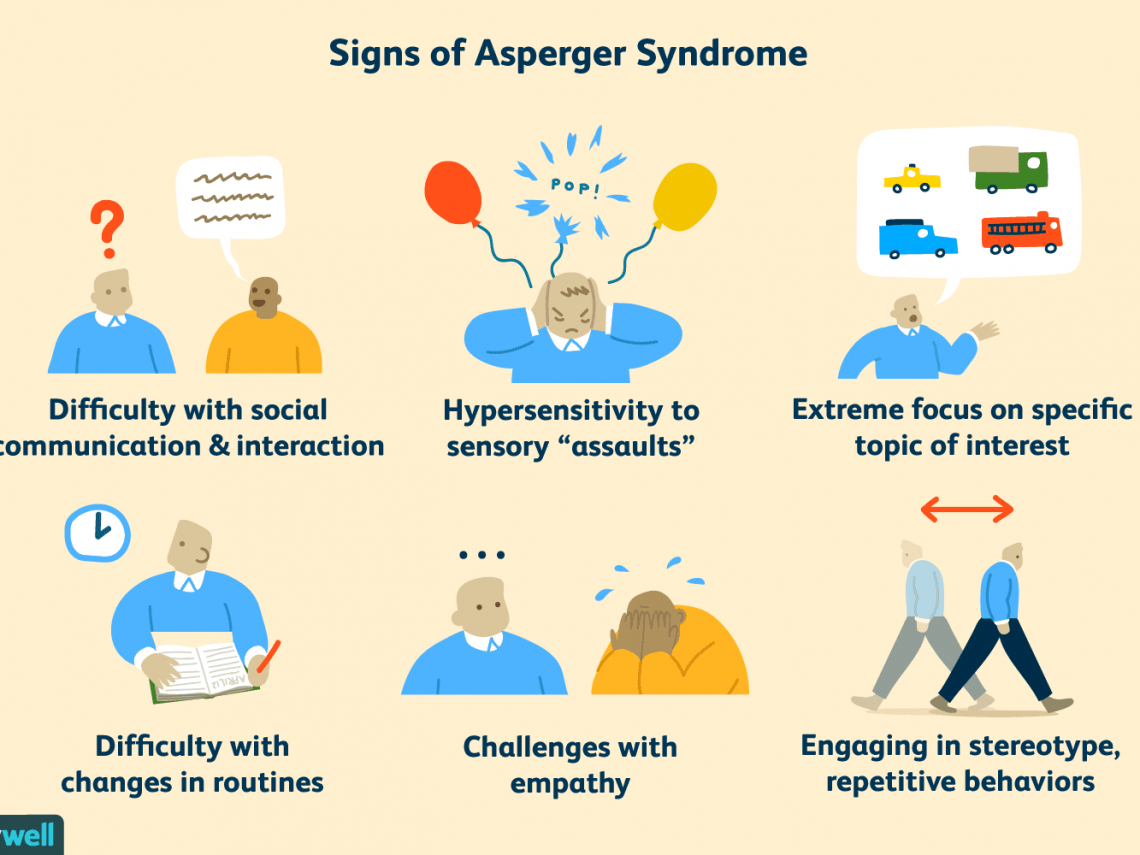
Asperger’s syndrome is a form of autism. It is a previously used diagnosis on the autism spectrum. In 2013, it became part of one umbrella diagnosis of autism spectrum disorder (ASD) in the Diagnostic and Statistical Manual of Mental Disorders .
Typical to strong verbal language skills and intellectual ability distinguish Asperger syndrome from other types of autism.
Symptoms of Aspergers’ Syndrome
- Difficulty with social interactions – people with AS may have difficulties when asked to interpret social or emotional issues, such as grief or frustration. Nonliteral problems- that is things that cannot be seen – may evade their logical ways of thinking.
- Restricted interest – it’s not uncommon for people to have hyperfocus as a symptom of AS. It’s usually toward a specific topic. They may have deep understanding and vast vocabulary related to this topic. They may also insist on talking about it when engaging with others.
- Desire for routine – engaging in repetitive behavior is a common symptom of ASD. This may include doing the same thing every morning before work, spinning something a certain number of times, or opening a door a certain way. Just because you engage in this type of behavior does not mean that you have AS – other disorders can result in these behaviors , as well.
- Distinctive strengths
Strengths can include
- Aptitude for recognizing patterns
- Remarkable focus and persistence
- Attention to detail
Challenges can include
- Difficulty with engaging in conversations
- Uncoordinated movements or clumsiness
- Hypersensitivities (to lights, sounds, taste, etc.)
- Difficulty with nonverbal conversation skills (distance, loudness, tone, etc.)
- Anxiety and depression
People with Asperger syndrome see, hear and feel the world differently to other people.
Autism is a spectrum condition. All autistic people share certain difficulties, but being autistic will affect them in different ways. Some people with Asperger syndrome also have mental issues or other conditions, which is why people need different levels and types of support.
People with Asperger syndrome are of average or above average intelligence. They don’t have learning disabilities that many autistic people have, but they may have specific learning difficulties.
They have fewer problems with speech but may still have difficulties with understanding and processing language.
Treatments for Asperger Syndrome may include
- Cognitive behavioral therapy – a therapist can help cope with some of the emotional effects of autism, such as social isolation and anxiety. They can also help in learning new social skills so engaging with others feels easier and less frustrating.
- Speech therapy – a speech pathologist can work with learning voice control and modulation
- Vocational therapy – most adults with autism can and do maintain full-time, successful jobs. However, some people may face career-related difficulties. Vocational therapists can help find solutions for the issues they face at work so that they can continue to be successful.
- Medications – in adulthood, prescription drugs may be used to treat individual symptoms, such as anxiety or hyperactivity. Some healthcare providers may also prescribe medications to try to reduce symptoms of AS. These medications include stimulants, antipsychotics, and serotonin reuptake inhibitors (SSRIs).
What We Offer
We at Almurshidi Medical Tourism will find the best doctors and hospitals to cater to your needs. We are partnered with a wide network of hospitals and clinics that provide top quality medical experience.
We provide free medical estimates, make medical appointments, and provide several medical opinions if needed at no cost.
Contact us
For more information contact us at +66822004040 or via WhatsApp







